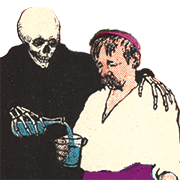|
Has anyone tried Mountain Home? https://www.drivethrurpg.com/product/370421/Mountain-Home-a-Forged-in-the-Dark-game-of-dwarven-settlementbuilding I have a buddy who wants to get his Dwarf Fortress on in a ttrpg. How Dwarfy is this? From one to five cat-splosions.
|
|
|
|

|
| # ? May 15, 2024 04:51 |
|
I'm trying to design a BitD-adjacent game and was curious, based on the criticisms I've seen here, what the players in the thread might want to/hope not to see in a Blades-ish game about fantasy revolutionaries assassinating adventurers. I jokingly describe it as Monster Hunter except the monsters are high-level D&D characters and the hunters are communist farmers. I'm open to any suggestions that kind of pitch might stir. But specifically, I'm hoping to have an open-table design, where the persistent elements in every session are the GM, the setting, and the players' targets, but the players, and the Agent characters they play, could be different each time. (They'll be simpler, broader characters than your typical BitD crew.) Play will also be structured into two phases each session: a higher-level, more abstracted Council Phase, where players influence the different parts of the revolutionary group and run quick, one-roll recon and maintenance missions, and a longer, more grounded Agent Phase, where players play as their Agents on a mission or two. What ideas, concerns, hopes, etc. might you have about a system that tries to wrap up any unfinished missions or unresolved fallout by the end of each session, because the next session might have a completely different roster of players and/or Agents? Would it be frustrating for the real-world time of the game session to be a timer on pulling off a mission? Would resolving unfinished missions with a simple roll if you ran out of time feel hollow? Would you be annoyed if you had to start a session by specifying and dealing with the fallout of an unfinished mission you might not have been a part of in the previous session? I want the players to feel like they're part of a bigger organization that they don't always have direct control of, and they have to adapt to the state the group is in at the time, working with what they have. Any suggestions to avoid or mitigate potential frustrations with that approach? JMBosch fucked around with this message at 16:38 on Nov 18, 2022 |
|
|
|
JMBosch posted:I'm trying to design a BitD-adjacent game and was curious, based on the criticisms I've seen here, what the players in the thread might want to/hope not to see in a Blades-ish game about fantasy revolutionaries assassinating adventurers. I jokingly describe it as Monster Hunter except the monsters are high-level D&D characters and the hunters are communist farmers. I'm open to any suggestions that kind of pitch might stir. One thing I'd say that's important mechanically is figuring out how 'expendable' the PCs are or even how winnable the long term goal of the protagonist org is/does the system support ongoing play afterwards? A common critique of Spire is the game only focuses on the revolution. Like blades generally starts with low level thugs scraping by, but also supports high tier "you run the underbelly of the city." Spire on the other hand is strictly a game about revolutionaries, so the party not succeeding-or the game ending if they do- is baked in. Limiting scores to a real life timer would be a hard pitch for my group, and I'd say would probably be intimidating for less experienced or confident players since asking questions or having aspects of the game explained to them would quite literally be burning resources. It would also encourage the loudest/quickest person at the table steering things -more so than what already happens in rpgs.
|
|
|
|
JMBosch posted:What ideas, concerns, hopes, etc. might you have about a system that tries to wrap up any unfinished missions or unresolved fallout by the end of each session, because the next session might have a completely different roster of players and/or Agents? Would it be frustrating for the real-world time of the game session to be a timer on pulling off a mission? Would resolving unfinished missions with a simple roll if you ran out of time feel hollow? Would you be annoyed if you had to start a session by specifying and dealing with the fallout of an unfinished mission you might not have been a part of in the previous session? To answer your questions: 1. I think trying to wrap it by session instead of by in-game mission should be a GMing goal, not a rule. Some days things will just run long (and you'll have to cut it); other days, things will run short (and what do you do? Start another mission and risk having to cut it off?) The ways to address a long mission or a mini-mission brought on by a short mission (overly simplistic mission, rushing through the mission, eliding important but not central parts of the mission, etc.) don't sound satisfactory. 2. Yes; see above. You can make it a GMIng goal, but I would hesitate to make it a game rule. 3. Ugh, I already hate engagement rolls and those are just to set initial position. Instead of settling it by roll(s), I'd rather have the mission success adjudicated by GM fiat as a failure, partially successful, completely successful, or critically successful based on performance to date in the mission, if I had to choose, but I really would rather not have it done this way (see #2) 4. Maybe a little, but a GM should be able to find something for me to do, even if it's just being the clock-monkey. I think that this is the preferable way to handle things, rather than try to wrap everything neatly.
|
|
|
|
Both of you bring up good points, and I'm definitely already looking at Spire and Wicked Ones for inspiration. Yeah, there are still big issues with session-limited scores/missions. I was drawing inspiration from the old-school D&D open table play. But I'm realizing that the narrative structure of a covert mission with specific goals is much more fragile than the narrative of dungeon delving to explore and loot, and it's much more difficult to justify why an Agent would abandon a mission than why an adventuring party would rush out of a dungeon back to town. GM fiat could probably work for a lot of the interrupted mission resolution, but I'd like to give them a bit more of a structure to work with. Maybe each mission has a primary goal clock and 1+ secondary goal clocks, and if a mission has to be cut short, the GM can make a (quick!) roll for each goal based on how far the clock is, with failure causing stress or something. In terms of lethality, Agents should be somewhat disposable. I'd probably aim for a good chance of a character dying once every 2 to 4 sessions or so. Making a new one should be fairly quick, but it drains some of the revolutionary group's resources. So intentionally killing off characters who are in bad situations shouldn't be a useable strategy. For the end game, currently the plan is that for each new player to your playgroup, the GM adds a new adventurer that needs to be taken down. (Each adventurer could take anywhere from like 1 to 5 sessions to take down.) So the bigger your pool of players for your campaign, the more threats need to be toppled to eventually "win" the campaign. If the players are able to eliminate all of the adventurers, they've grown their revolutionary group to be strong enough to rival the current sovereign, who was no more legendary adventurers to hire to protect them. The intent is that you would wrap up the campaign there, or maybe run one more "adventurer" as the sovereign before wrapping up. Then you could write up a new setting and campaign. But if that's already an existing criticism of Spire, I may have to rethink it. Blades seems to get most of its higher-level play from the faction game, trying to stay on top, right? I still need to work out the mechanics having to do with "society at large," so maybe I can break society into a cast of demographics or interest groups that have their own needs and desires they're pursuing, that the revolutionary group either helps or gets in the way of. But if the council gameplay isn't as engaging as the mission gameplay, it might feel kind of hollow.
|
|
|
|
My game has ended up a lot different from what you’re going for but one thing I’ll say is that it can be hard to really nail down the timing of sessions in a way that I didn’t experience with like 5E. I think because you can get away with less structure in a BITD game and because I do let my players “plan” a little more than the game would like, though, I’ve found this a struggle. Some “simple” scores end up going over two sessions because the players just ended up in a cool scenario they wanted to do more actions/narrate more where others they’re okay blowing through large sections of a score with minimal exposition. I couldn’t really nail down when I was going to go long or short and just planned for both outcomes, including if we started up finishing the previous week’s score. I was helped by having a static group that tended to eschew more of the disposable nature of PCs (at least to the full extent of the game, we still had a little shuffling.) It sounds like you’ve probably got enough experience that you’re aware of this and how to manage it though so maybe it’s not a big revelation. Anime Store Adventure fucked around with this message at 22:19 on Nov 18, 2022 |
|
|
|
JMBosch posted:But specifically, I'm hoping to have an open-table design, where the persistent elements in every session are the GM, the setting, and the players' targets, but the players, and the Agent characters they play, could be different each time. (They'll be simpler, broader characters than your typical BitD crew.) Play will also be structured into two phases each session: a higher-level, more abstracted Council Phase, where players influence the different parts of the revolutionary group and run quick, one-roll recon and maintenance missions, and a longer, more grounded Agent Phase, where players play as their Agents on a mission or two. have you looked at band of blades? i haven't played it, but my impression is that it has a similar loop: what really persists between sessions is the military company and the high ranking soldiers. individual missions are played using the grunts of the company, who can survive to join later missions, or die with no big impact on the company itself
|
|
|
|
I had looked at Band of Blades briefly. I like the asymmetric player roles, but I also saw a big review complaining that it was too resource-management-heavy for the party to engage with much else and that keeping all of its plates spinning in the air was really draining on the players. If anyone's had experience playing or running it, I'd be interested to know if you felt similarly or not. I'm definitely moving away from the rigid session structure for my game, though. It'll probably be more rewarding (and less frustrating to run) for it to flow more like BitD does, following the fiction and just bringing in the different mechanics when needed. The revolutionary group will now be much more distant and abstract, focusing much more on the Agents, and I'll probably cut some of the "Councils Plotting Missions" phase and reabsorb the remains of that into the Agent's actions. It might have been a bit of the ol' hubris to try cramming systems for running a radically democratic, multi-council revolutionary government and a low-level civil war into my game about, essentially, assassinating fantasy billionaire adventurers to stop genocide and environmental destruction. Refocusing on the various human and non-human communities that are impacted by the adventurers' actions and how the Agents form connections with them, rather than on the various sectors of society wanting revolutionary change. But I'll still need some kind of "bridging" mechanic to hold on to some sense of continuity between the sessions, regardless of where the last one left off and the next one is starting.
|
|
|
|
JMBosch posted:I had looked at Band of Blades briefly. I like the asymmetric player roles, but I also saw a big review complaining that it was too resource-management-heavy for the party to engage with much else and that keeping all of its plates spinning in the air was really draining on the players. If anyone's had experience playing or running it, I'd be interested to know if you felt similarly or not. This sounds like it was written by someone who never played BitD because BoB's campaign phase resource management is roughly as complex as BitD's, and is entirely confined to the campaign phase (also like BitD). The in-mission "resource management" (spending stress) is exactly identical. If you have specific questions I can answer them as I just finished running the campaign, but I would suggest just reading the game in full. e; though one piece of completely fair criticism you can levy against BoB is that like a lot of PbtA/FitD hacks it assumes complete mastery of the game it's a hack of. The BoB rulebook places too much apparent focus on the campaign mechanics, because those are the most different from BitD, and fails to stress that the vast majority of the campaign phase needs to be spent roleplaying the Legion's life (with the actual campaign mechanics being something you sort out in a few minutes). If you don't already have experience playing/running BitD it's easy to make the mistake of thinking the campaign phase is a pure mechanical phase and all roleplaying happens in the missions, and end up with a really unsatisfying experience. Lemon-Lime fucked around with this message at 17:06 on Nov 20, 2022 |
|
|
|
Lemon-Lime posted:If you don't already have experience playing/running BitD it's easy to make the mistake of thinking the campaign phase is a pure mechanical phase and all roleplaying happens in the missions, and end up with a really unsatisfying experience. How many sessions did it take for your campaign to get to the end in BoB? And how long were your sessions? Would you be able to give a rough ratio of how much of that time was spent doing what?
|
|
|
|
JMBosch posted:How many sessions did it take for your campaign to get to the end in BoB? And how long were your sessions? Would you be able to give a rough ratio of how much of that time was spent doing what? The campaign ran for ~14 months with one session every other week, for a total of 29 sessions, which were generally around 3 hours long (sometimes a little shorter or a little longer if we hit a natural break point). We made the mistake of not spending nearly enough time in campaign phase free play scenes at the start, so for maybe the first third of that we were jumping from mission to mission as quickly as possible, which really hurt the experience. After course-correcting, we started splitting the time roughly 50/50 between mission and campaign phases. Most of the time this was literally a full session in a mission followed by a full session for one campaign phase (including the time spent generating new missions, doing the mechanical bits, and roleplaying what the Legion was up to). Rarely, this would be a shorter mission and a shorter campaign phase in the same 3 hour session, just because not every mission has enough meat to it to justify spending 2-3 hours. Generating missions usually took me about 30 minutes, which I would try to do between sessions when possible, but sometimes it made more sense to do it with the players present. Doing campaign actions would usually take 20-30 minutes as the players discussed what the Legion needed most. The rest of the campaign phase was spent in free play scenes deciding what was happening to the various legionnaires and command staff during or between missions.
|
|
|
|
Thanks for the breakdown; that helps give me more perspective. Guess I need to focus on making all relevant "modes" of play interesting and versatile enough that each group will find the balance they like most, and provide enough GM guidance to make sure they don't lose the forest for the trees. I don't mean to hijack the thread for design talk. I'm just interested in how to hit a similar "game feel" to something like BitD without simply lightly tweaking the FitD system.
|
|
|
|
We did a post-mortem on the campaign after it ended and I had a bunch of notes which I'd been meaning to write up for this thread, as well, so I took the time to do so just now. Here are the things myself and my group took away from my running BoB for them, split into three categories (the stuff you absolutely need to know, small mechanical things I would consider houseruling, and some more minor points about the fictional framing of the whole campaign): Important game things:
Mechanical quibbles:
Verisimilitude stuff:
Lemon-Lime fucked around with this message at 02:53 on Nov 21, 2022 |
|
|
|
One thing you should do which I saw in the RITS hack but came up with independently is just like trauma and vice and background, you should make roleplaying Harm an xp trigger. This way players actually remind you when they have -1D on a roll.
|
|
|
|
dex_sda posted:One thing you should do which I saw in the RITS hack but came up with independently is just like trauma and vice and background, you should make roleplaying Harm an xp trigger. This way players actually remind you when they have -1D on a roll. oh this is clever
|
|
|
|
dex_sda posted:One thing you should do which I saw in the RITS hack but came up with independently is just like trauma and vice and background, you should make roleplaying Harm an xp trigger. This way players actually remind you when they have -1D on a roll. That's a neat idea that also makes curing harms less of an ASAP thing
|
|
|
|
Captain Walker posted:Blades in the Neath Very early WIP sheets for playbooks and crews. Hoping for critique from TG goons. Design and setting notes: • A major conceit in the Fallen London setting is that people do not die if they are killed. Well, they do, but they get better after a narratively appropriate amount of time. There's some changes to the Harm and Trauma rules reflecting this. • There's no ghost field or unified source of magic, but there are a lot of weird phenomena and I want every playbook to have access to at least one. The Whisper is largely unfinished because I wasn't sure about a more specific focus than "person who does witchcraft". • PCs in Fallen London inevitably usually get to tier III or IV just by nature of being protagonists. A crew of thugs and lowlifes will have to fight for every centimetre of turf. • I wanted to distill the crew types down to Shadows, Firebrands (Bravos with revolutionary flavor) and Wheelers (combined Smugglers/Hawkers). Not sure how well I handled that.
|
|
|
|
Clarifying rules question: you can spend a Coin to improve the result of a downtime activity, but does that extend to Train? The way it’s written doesn’t make clear whether Train is an exception among downtime activities, but since it doesn’t involve a roll it’s unclear how the normal “spend a coin to improve” mechanic would apply. Another player in a group I’m in was wondering if they could spend a Coin to get +1 XP and put themselves over the line to get another dot in an action.
|
|
|
|
Pirate Radar posted:Clarifying rules question: you can spend a Coin to improve the result of a downtime activity, but does that extend to Train? The way it’s written doesn’t make clear whether Train is an exception among downtime activities, but since it doesn’t involve a roll it’s unclear how the normal “spend a coin to improve” mechanic would apply. Another player in a group I’m in was wondering if they could spend a Coin to get +1 XP and put themselves over the line to get another dot in an action. Rules-as-written I'd say you can't. You're not improving the result of a die roll and you can't train more than once per downtime. The Crew training upgrades give 2xp for each category when training though if they already have one of those they've overlooked. WhiskeyWhiskers fucked around with this message at 05:58 on May 29, 2023 |
|
|
|
Lemon-Lime posted:We did a post-mortem on the campaign after it ended and I had a bunch of notes which I'd been meaning to write up for this thread, as well, so I took the time to do so just now. Heya I know this is very late, but thanks for this. I've never run a Band of Blades game but it is always something I would love to do at some point, and I wanted to thank you for making this list of hints and tops and telling your story.
|
|
|
|
This is admittedly judgemental and maybe speaks to me and my players, but the minute players start really drilling into how to get extra XP out of training, it feels like I’ve started to lose the thread of the system and what I should be pushing people toward. I had to really lay into making people come up with little described vignettes for training because that started to want to spend every last resource on that because it led to better dice. I get it, but I feel like my players let me down a little in being too worried about mechanical outcomes and I tried to redirect the energy desperately once they figured out how to say “I want to gain experience without any fiction/play.” Maybe this is not relevant to your situation but having DMed Blades for over a year now whenever a player starts poking into “But what about this, but with training?” It starts to raise red flags for people trying to extract a more mechanical result than the fiction first approach the game and myself as GM try to cultivate.
|
|
|
|
Anime Store Adventure posted:This is admittedly judgemental and maybe speaks to me and my players, but the minute players start really drilling into how to get extra XP out of training, it feels like I’ve started to lose the thread of the system and what I should be pushing people toward. I had to really lay into making people come up with little described vignettes for training because that started to want to spend every last resource on that because it led to better dice. I get it, but I feel like my players let me down a little in being too worried about mechanical outcomes and I tried to redirect the energy desperately once they figured out how to say “I want to gain experience without any fiction/play.” I’m not the GM this time, so I’m not necessarily steering the group, but this is my whole group’s (GM included) first time playing Blades so there’s definitely a learning process for us in figuring out the sort of landscape of the system and what comes first at different times.
|
|
|
|
Pirate Radar posted:I’m not the GM this time, so I’m not necessarily steering the group, but this is my whole group’s (GM included) first time playing Blades so there’s definitely a learning process for us in figuring out the sort of landscape of the system and what comes first at different times. I love the system but I’ve come to realize that my group isn’t great for it, as they want more mechanical depth I’m not willing to try and host as a GM. Again though, maybe not relevant for you hopefully! Its a great system if you have very “fiction first” players and while I know the book says it, I can’t emphasize enough that it really does live or die around that. My players really want to play a Bethesda RPG in terms of mechanical depth, and now that they’ve sniffed out how the dice work, I’m considering a hard stop and trying to find a more appropriate system and/or a different GM. E: I feel like I’m offloading my own games baggage too much. The takeaway I want to express is that any rules are fine if they fit the fiction. Improving outcomes in downtime might not fit the book but if someone made it a good story I’d let them have whatever outcome they were shooting for.
|
|
|
|
I'd suggest Burning Wheel if you do change games. It might scratch their fondness for diving into mechanics while really tying their powergaming into their characters' motivations and beliefs. I don't particularly like reading or running Burning Wheel, but it really does get people to think about their roleplay better.
|
|
|
|
Lemon-Lime posted:[*]The way morale loss from casualties works and the way it ties in to the number of campaign actions you get can be really wonky if your players don't grasp its importance ahead of time. You may end up having to treat NPCs with kid gloves (in a way that damages the war-horror part of the fiction) because otherwise the morale cost would significantly hamper the players' ability to take actions during the campaign phase. On the flipside, if no one is really dying, morale is absolutely trivial to replenish because Liberty gives so much free morale (and players will want to take Liberties to restore stress anyway). I'm also very late to this but I do like this idea as well as removing campaign action restrictions based on morale (and changing it with some other mechanical difference). It was very difficult as a GM to really hammer home the "War is hell, people are gonna die" part when every single individual rookie death is so mechanically devastating. It's easy enough to replace them with new rookies but the actual morale loss is enough to sink the whole campaign. Even just losing a couple soldiers in a mission would be enough to lead to a morale/stress spiral that they would be hard pressed to get out of, especially if they dipped low enough to lose out on campaign actions altogether. Other than that though I absolutely loved the setting and the other mechanical bits and bobs. I would just definitely look for an alternative to how morale works for sure.
|
|
|
|
That always seems like a hard mechanical problem to me. If you don't have any comeback mechanics, then you end up not really engaging with anything that starts a negative spiral because its better to just scrap the whole thing and start fresh - or just turn off the system - than deal with it, which means you basically have a binary between flawless runs and "we just quit." On the other hand, anybody who's seen speedrunning or thought about strategy games knows that if comeback mechanics are too strong then the optimal strategy becomes counterintuitive e.g. feed a redshirt into a woodchipper at the start or end of every mission.
|
|
|
|
DarkAvenger211 posted:I'm also very late to this but I do like this idea as well as removing campaign action restrictions based on morale (and changing it with some other mechanical difference). Yeah, as a player in said campaign, i definitely felt like it took a while to get into killing people at the rate we really needed to. I felt like the legion in general needed more resources to allocate, and opportunities to get odds and ends. I think there's something to be said for adding some mechanic to give a random thing going into each stop on the journey, or an opportunity to get random things without spending campaign actions.
|
|
|
|
How complex can flashbacks get? Is it always supposed to be a single roll, or can you do an entire mini-heist to establish how you prepared for the current one? In connection, is it possible to nest flashbacks? Like, if a flashback goes wrong, can you flashback to an even earlier time to establish how that was you plan all along?
|
|
|
|
|
Let your players run wild with flashbacks IMO. They are one of the best features of this system and with the right players they can become some of the best moments at the table. In our experience, flashbacks usually don't need rolls because they usually don't involve things that have much risk. As an example, I was a player in my group for a couple of weeks, and I used a flashback to tell a mini story about acquiring a deadly poison. I had just served a bunch of bad guys from a sealed bottle of brandy and the flashback was to establish that the Brandy was poisoned. As a rule of thumb, we use flashbacks to let players create the past in a way that can affect the present. It lets things get cinematic. If your players want to engage in flashbacks that involve things like rolls, then it's not really a flashback IMO but there definitely isn't a rule against that and if everyone enjoys it, then I say go for it.
|
|
|
FLIPADELPHIA posted:In our experience, flashbacks usually don't need rolls because they usually don't involve things that have much risk. As an example, I was a player in my group for a couple of weeks, and I used a flashback to tell a mini story about acquiring a deadly poison. I had just served a bunch of bad guys from a sealed bottle of brandy and the flashback was to establish that the Brandy was poisoned. The rules definitely imply that rolling for flashbacks is the usual outcome: https://bladesinthedark.com/planning-engagement posted:Flashbacks What I'm curious about is if people always handle flashbacks in a single action - with or without rolling - or if they sometime involve elaborate mini-adventures?
|
|
|
|
|
SimonChris posted:How complex can flashbacks get? Is it always supposed to be a single roll, or can you do an entire mini-heist to establish how you prepared for the current one? They're flashbacks, they're happening as a break in the actual action to set something up for immediate resolution as soon as the flashback is over. If they start involving more than a roll or taking more than a couple of real-time minutes to resolve, they should have been a regular score instead. This is both RAW and also best practice if you want the game to flow at all when flashbacks are used. That said, anything is fair game as long as it fits within those limits - if you can work your way through your entire mini-heist in that single roll and a few minutes of talking about what happened, that's totally a valid flashback. So would a flashback that involves weeks of building up a contact or whatever. SimonChris posted:In connection, is it possible to nest flashbacks? Like, if a flashback goes wrong, can you flashback to an even earlier time to establish how that was you plan all along? Is it possible? Sure, why not. Do you want to do this? No, for the reasons outlined above. Lemon-Lime fucked around with this message at 15:21 on Sep 8, 2023 |
|
|
|
SimonChris posted:The rules definitely imply that rolling for flashbacks is the usual outcome: For pacing's sake, flashbacks are best boiled down to a single discrete "focal point" where we see how well the scoundrel actually pulled it off, even if that moment would have required a bunch of off-screen support. Remember also that a single roll, whether action or fortune, can already encompass a lot of time/activity: e.g. if your flashback involves "recruit a gang of toughs to show up and back me up," you don't need to play out a bunch of scenes of seeking out willing gang bosses and haggling with them individually, just roll Consort and maybe drop some Coin. If you really feel like a flashback needs more than one action to resolve, it probably has a high stress cost due to complexity. SimonChris posted:In connection, is it possible to nest flashbacks? Like, if a flashback goes wrong, can you flashback to an even earlier time to establish how that was you plan all along? This is definitely going to start hitting those "unlikely or complicated action" qualifiers and will almost certainly warrant increasing stress costs.
|
|
|
|
SimonChris posted:The rules definitely imply that rolling for flashbacks is the usual outcome: IME the majority of flashbacks are the zero stress type which almost never involve a roll. Also, rolls and subsequent consequences really kill the flow of the game and can complicate the current scene if the GM isn't quick on their feet. I'm not against rolls in flashbacks at all, but players generally don't want to face them.
|
|
|
|
I just kind of like the idea of running a fractal heist where individual actions expand into earlier heists. I realize that's not the normal way of doing things, and the sub-heists would need to be very short, but it could be cool setup for a particularly epic score.
|
|
|
|
|
Consequences for partial/failed rolls in flashbacks just happen outside of the flashback, in the current score, not inside the flashback. In general, I treat rolling as a flashback cost. If a flashback already costs 2 or more stress, I'm less likely to ask for a roll, because the stress already paid for it. Instead, I'm more generous about what a 0-stress flashback can accomplish, but I generally ask for a roll. SimonChris posted:I just kind of like the idea of running a fractal heist where individual actions expand into earlier heists. I realize that's not the normal way of doing things, and the sub-heists would need to be very short, but it could be cool setup for a particularly epic score. Yes, there's absolutely nothing stopping you from doing this, and it would be fun if everyone's on board, especially in a oneshot or a big climactic heist. In normal play, flashbacks don't work that way because otherwise the game would grind to a complete halt every time someone tries to flashback, which goes against the intent.
|
|
|
|
Lemon-Lime posted:Consequences for partial/failed rolls in flashbacks just happen outside of the flashback, in the current score, not inside the flashback. Yeah, that's what I see people struggle with tying the two together. If it's something simple like a failed bribe -> guards on high alert it's not much of an issue, but it's rarely that straightforward for folks. quote:Instead, I'm more generous about what a 0-stress flashback can accomplish, but I generally ask for a roll. That seems opposite of what's intended by the scale quoted above. More complicated flashbacks cost more stress because they can achieve more. The complication naturally leads to more rolls to pull it off.
|
|
|
|
Bottom Liner posted:That seems opposite of what's intended by the scale quoted above. More complicated flashbacks cost more stress because they can achieve more. The complication naturally leads to more rolls to pull it off. No, the stress cost has absolutely nothing to do with requiring more rolls; a 6 stress flashback should still take only one roll to resolve. What the stress cost measures is how much suspension of disbelief is required for everyone to accept that the stuff being depicted in the flashback happened ahead of time while no one was looking. It's there to prevent players from doing constant asspulls. 
Lemon-Lime fucked around with this message at 16:48 on Sep 8, 2023 |
|
|
|
I agree with that last part. Generally we think of 0 cost as not even requiring an actual flashback scene, it's just a note of "hey I did a very small thing a few days ago". Mostly obvious stuff that won't be a big change in the current scene. 1 stress requires a bit more detail and maybe a roll depending on the goal. 2 is a full setup that definitely will cause a roll.
|
|
|
|
It's also worth remembering that flashbacks are probably going to have a different level of risk/effect than they would if you were doing them mid-heist, just because you're doing it at an earlier point when you're more prepared to be doing things. So, that flashback has much better odds of being controlled than anything you'd do normally, so you can probably just give them a slightly tricky choice and it will fit. You flashback to bribing a guard to let you onto the roof and roll a failure, but since you're bribing them on your terms it was controlled so the results can just be "your man on the inside held up his end of the bargain and left the roof access unlocked; however, now that you're up here, you see that the shutters on the window you were going to rappel to are closed. Are you going to rappel down anyways and try to open the shutters with your rear end hanging out in the wind, or are you going to improvise?". You can just give them a minor complication to work around on their flashback and call it a day. This won't help with riskier flashbacks, but those are also meaty enough that you'd hopefully have an easier time thinking of something bad to happen.
|
|
|
|

|
| # ? May 15, 2024 04:51 |
|
I think the tricky part is getting players to engage with complicated flashbacks that can cause current complications, because at that point why not just face the current situation as is? As players learn the system and get more bold with the power these systems give them they get way more creative, but getting them there is tricky and often requires being led towards it or seeing another player do it first.
|
|
|
























